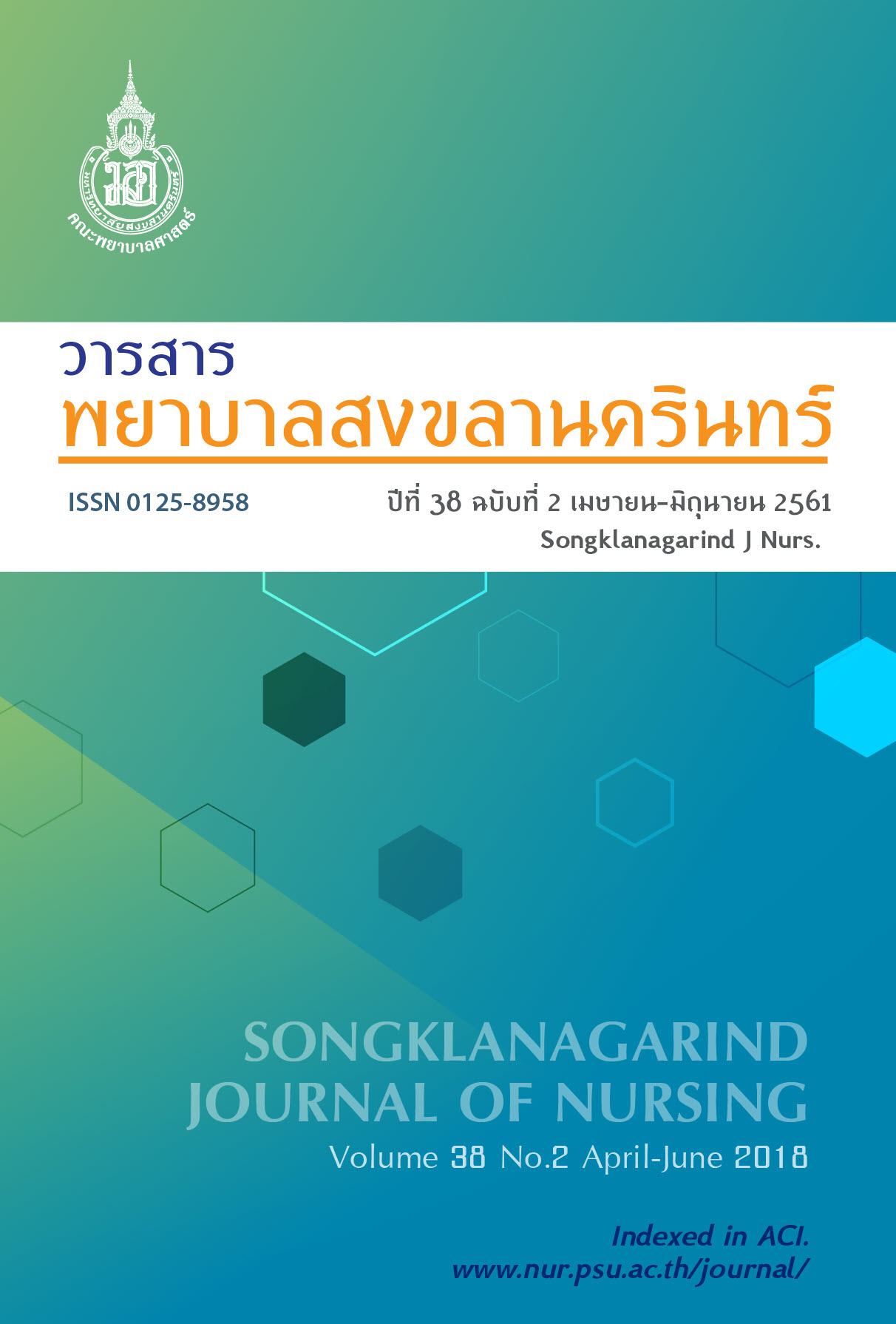Competency of Nurses on the Nursing Practitioner Course in Renal Replacement Therapy (Hemodialysis) Prince of Songkla University
Main Article Content
บทคัดย่อ
This descriptive research study aimed to investigate the competency of a nursing practitioner course
in renal replacement therapy (Hemodialysis), Prince of Songkla University and to compare the perceptions
associated with nursing competency among nurses who had finished the hemodialysis course, their supervisors
and their colleagues. One hundred and five participants were included in the study. Data were collected
from June 2016 to August 2017. Study instruments included two parts: a demographic data form and a
hemodialysis nurse competency questionnaire, all instruments were content validated by three experts. The
hemodialysis competancy questionnaire for nurses was tested with a content validity of 1 and reliability with
Cronbach’s alpha coefficients of 0.91, 0.96 and 0.96, respectively. Data were analyzed using percentage,
mean, standard deviation and F-test.
The results revealed that mean score of the competency of hemodialysis nurses was high level
(nurses who had finished the hemodialysis course M=3.73, SD=0.34; their supervisors M=3.62, SD=0.48 and
their colleagues M=3.75, SD=0.48, respectively) and there was no statistically significant difference related to
the competency of hemodialysis nurses between the groups (F=0.843, p= 0.434).
According to the study findings, the nursing specialty course in renal replacement therapy nurse
practitioner (Hemodialysis) should be developed and improved, especially competency related to evidence
based practice and research in order to improve nurses’ ability to enhance patients’ outcomes.
Article Details
เอกสารอ้างอิง
2. Lai AY, Loh AP, Mooppil N. et al. Starting on haemodialysis: A qualitative study to explore the experience and needs of incident patients. Psychol Health Med. 2012; 17(6): 674-84. doi: 10.1080/13548506.2012.658819
3. Lee BO, Lin CC, Chaboyer W, et al. The fatigue experience of haemodialysis patients in Taiwan. J Clin Nurs. 2007; 16(2): 407-13. doi: 10.1111/j.1365-2702.2005.01409.x
4. Junvas W, Ekwarangkoon P. The follow up studyof nursing specialty curriculum in renal replacement therapy nursing for kidney expert nurses Thailand Nursing and Midwifery Council. Thai Journal of Nursing. 2014; 63(3): 56-64.
5. Rassametummachot S. Competency-based learning. 3rd ed. Bangkok: Siriwatany Inter print; 2006. Thai.
6. Rassametummachot S. Competency: Management tools are undeniable. Productivity. 2004; 9(53):44-8.
7. Program of Nursing Specialty in Renal ReplacementTherapy Nurse Practitioner (Hemodialysis). 2016.
8. Ketanun C, Prachusilpa G. Predicting factors of competency of hemodialysis nurse. Journal of the Police Nurse. 2014; 6(1):71-84.
9. Hoemchommongkhon R. A study of experthemodialysis nurses competency [Thesis]. [Bangkok]: Chulalongkorn University; 2008. 182 p.
10. American Nephrology Nurse’s Association [ANNA]. Scope of practice for nephrology Nursing; 2011 [cited 2016 Jun 16]. Available from: http://annanurse.org/professional-development/practice/scope-of-practice/nephrology-nursing.
11. Blaikie N. Designing Social Research. 2nd ed. Cambridge: Polity Press; 2009.
12. Kannasoot P. Statistics for behavioral Scienceresearch. 3rd ed. Bangkok: Chulalongkorn University Press;1999.Thai.
13. Rodkhunmang S. Factors influencing competencies of operating room nurses in the Northeast regional hospitals under the jurisdiction of the ministry of public health, Thailand [Thesis]. [Khan-kaen]: Khan Kaen University; 2010. 197 p.


